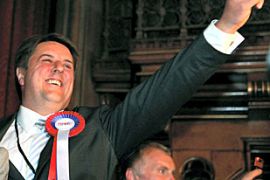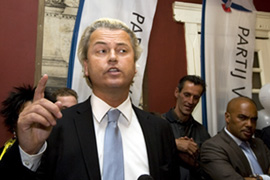EU election sees swing to the right
Conservatives and far-right make gains amid record low turnout in 27-nation poll.

Right-wing gains
Joseph Daul, the leader of the European People’s Party, the main umbrella group for centre-right national parties, said his bloc would back a $27bn EU plan that allocated no new money for stimulus programmes.
It would instead require European governments to more quickly spend existing EU funds on job-creation.
| In depth | ||
|
|
Other priorities for the centre right include common immigration and energy policies to reduce the number of illegal migrants and to lessen Europe’s dependence on Russian natural gas exports.
Right-leaning governments came out ahead in Germany, France, Italy and Belgium, while conservative opposition parties won in Britain, Spain, and Bulgaria.
Poul Nyrup Rasmussen, president of the European Socialists group, said his member parties would “continue to fight” for more money.
“Europe still needs a new direction. We are in the middle of a recession and it will not go away,” he said.
The Labour party of Gordon Brown, the British prime minister, finished third behind the UK Independence Party, an anti-EU party.
Labour’s worst post-war election result casts more doubt on Brown’s future, in the wake of a series of resignations by Labour ministers.
‘Anti-Semitic’ charges
Far-right groups made gains in Britain, Austria, the Netherlands and Hungary.
 |
| Wilders’ party won four of 25 seats in the Netherlands on an anti-Islam ticket [AFP] |
The election saw the all-white British National Party (BNP) pick up two seats in the EU assembly for the first time ever.
The BNP will join other successful far-right parties from the Netherlands, Hungary and Austria that have criticised Islam, immigrants and minorities.
Austria’s big winner was the rightist Freedom Party, which more than doubled its strength over the 2004 elections to 13.1 per cent of the vote.
In the Netherlands, the Party for Freedom, led by Geert Wilders, took 17 per cent of the country’s votes, winning four of 25 seats on an anti-Islam ticket.
Three of 22 seats in Hungary went to the far-right Jobbik party, which describes itself as against immigration.
Critics say the party is racist and anti-Semitic.
Sarkozy success
In Germany, the ruling Christian Democrats convincingly defeated their rival Social Democrats, only months before the country holds its own national election.
Volker Kauder, the leader of the Christian Democrats in the German parliament, said: “We are the force that is acting level-headedly and correctly in this financial and economic crisis.”
Nicolas Sarkozy’s, the French president, governing conservatives trounced the socialists, while the green Europe-Ecologie party, posted third place.
In Italy, Silvio Berlusconi’s centre-right coalition fared well with about 35 per cent of the vote, boosting the prime minister.
But conservative success was not uniform across Europe.
Voters angry over unemployment, inflation and political scandals punished right-leaning ruling parties in Greece, Hungary and the tiny island of Malta.
